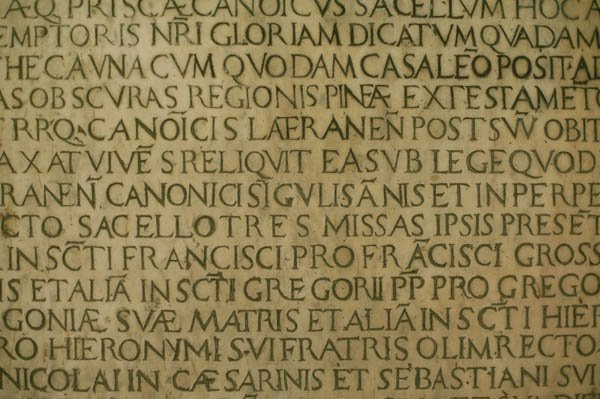It would be futile to look for the tomb of the Emperor Oxopulliustinianthemiopotamos: he was buried in a secret place, in an unmarked grave. A sad end for the descendant of so many illustrious Roman families.

The pater familias of each of these families could never agree about which name should have the preeminence for their children. So, they chose to combine them all, unwittingly condemning their descendings to mockery and opprobrium.
This pragmatic but cumbersome solution did not help the young Emperor at all during his years as student, and almost ruined the Empire when he became the most important man of the Empire.
The tradition was to carve this name in as many stone and marble monuments as possible. But it turned out that his name was so long that there was not a single monument large enough to accomodate all the letters.
The Senate summoned engineers from all around the Empire to find a solution. Their conclusions: they had to enlarge the pedestals and the plinths, the facade of the temples and the mausoleums... But this meant to enlarge as well the streets in order for these for those monuments to fit. And it didn't stop there. They had as well to bring down the fortifications of the cities in order to enlarge the cities themselves.
Had it been only for Rome, such a crazy policy would have been possible, because the Eternal City had seen a lot of crazy emperors. But what was implemented in the capital had to be replicated in all the cities of the Empire, because the name of the Empire had to be venerated in all corners of the known world.
So, if each city had to enlarge itself, its domain would have to grow as well. They would have to build upon fertile lands, and to steal good lands from the farmers and from the own estates in order to make place. Distant towns would suddenly become closer the ones from the others, with all the subsequent loss of revenues from forest and arable lands in between, and all the following legal disputes.
The only viable solution was to push the frontiers away, but the Empire had chosen a long time ago to fall asleep behind its borders and no one was willing to draw plans to conquer new territories in order to feed that urbanistic inflation.
In conclusion, it was impossible to honour the name of the Emperor without leading to the ruin of the Empire itself.
So the Senate suggested the Emperor to change his name. It was, after all, common for Emperors to assume new names and titles. But the Emperor refused. He still resented the bullying of his school comrades (some of whom were in the Senate nowadays) and of his teachers who didn't bother to remember more than the first two syllables of his name.
He wanted all of his subjects to remember his name and ordered the engineers to start working. But before they could have carved the third letter in stone, the Senate swiftly acted : the Emperor was deposed, executed, buried in an unmarked grave, never to be spoken about again.
